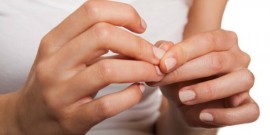
Nail-biting is a bad habit that can lead to some dental problems. Read the article below to learn all about nail-biting and how it can negatively affect you. Thanks for visiting Surrey Endodontic Centre.
The nail-biting truth of onychophagists
Do you bite your nails? If so, you may think you’re doing yourself a favor by efficiently engaging in normal grooming activities. But using your teeth instead of fingernail clippers or nail files typically means that you’re suffering from a pathologic grooming condition known as onychophagia and that you are doing more harm than good.
An onychophagist, or more commonly a “nail biter,” is a person who habitually bites his or her fingernails. Nail biting is a common oral habit among children and young adults, and is the most common of the typical nervous habits such as nose picking, hair pulling, tooth grinding or skin picking (Sachan). According to the DSM-5, the Diagnostic and Statistical Manual of Mental Disorders – Fifth Edition, nail biting is an impulse control disorder and is classified under obsessive-compulsive disorder (OCD) and related disorders (APA).
Studies have shown that between 26 to 33% of children between the ages of 7 to 10 and 45% of adolescents are nail biters (Leung). Up until age 10, nail biting is observed equally in boys and girls but increases significantly in boys thereafter (Sachan). Quite interestingly, nail biters don’t discriminate between the 10 fingers and tend to bite all of them equally (probably part of the OCD) (Leung).
Several factors have been suggested to cause nail biting, including hereditary, learned behaviors from family members, transference of thumb sucking from childhood, stress, anxiety, boredom and poorly manicured nails (Leung).
Besides being unsanitary, there are several complications that arise from this behavior.
Continue reading HERE.


